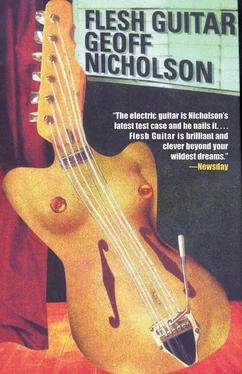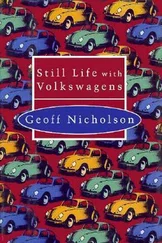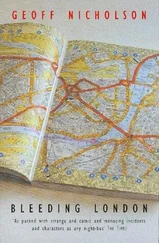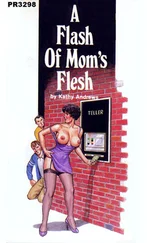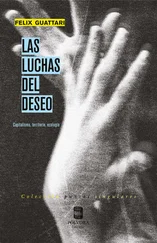‘Not me, Kurt. Any thoughts on what you want to have done with your ashes?’
‘Nah, I won’t be around to worry about it, will I?’
‘So it would be all right for Buddhist students to turn some of them into figurines, and for Courtney to carry the rest of them around inside a teddy bear.’
‘Oh sure, like that’s really going to happen,’ he says, and Jenny doesn’t disabuse him.
Suddenly he shouts. ‘I know. I’ve got it. What I need is something from Neil Young. I mean, he’s the godfather of grunge, right?’
‘I like it,’ Jenny agrees. ‘Go for it, Kurt. What’s it going to be?’
Kurt picks up the guitar, strums a few easy, unamplified Neil Young chords, then says, ‘Yeah, I got it. I got it.’
‘Great,’ Jenny says enthusiastically, and she watches as Kurt takes up the pen again and writes across the page those immortal words ‘I’ve been a miner for a heart of gold — and I’m gettin’ old,’ and signs it with a flourish.
‘Oh come on, Kurt,’ Jenny says irritatedly. ‘I know your brains are scrambled but you can do better than that.’
Kurt shivers. The room is suddenly cold and the desk looks as big as a pool table. He doesn’t think he can do better than that at all.
She feels sorry for him, and takes his hand and guides it as it writes down a far better Neil Young line, the one about rust and fade. Kurt looks at the words on the page and feels pleased with himself. Jenny seems pleased with him too. She looks out of the window. She can see water, trees, hedges, a well-kept lawn. It’s OK here. A young couple and their baby could lead a very comfortable, privileged life in this place if they had a mind to.
‘Hey, I think I’ve got a better line,’ she says.
But it’s too late. Behind her the shotgun goes off and Kurt turns himself into a sort of hero, a member of the stupid club.
Jenny shrugs, looks at her watch. It’s still early. She wishes he’d hung around and at least offered some advice to the aspiring guitarist. She wishes he’d at least waited until she’d told him to use a better Neil Young line. ‘Got mashed potato. Ain’t got no T-bone.’ That’s what she’d have recommended. But maybe Kurt wouldn’t have liked that so much. He never looked much like a T-bone kind of guy.
Bob Arnold reviews a Jenny Slade gig and decides she’s the Po-Mo queen of the guitar.
The Club Tutto, Milan: a converted small arms factory on a hot September night in the early nineties. Jenny Slade and the latest incarnation of the Flesh Guitars bounce on to the stage, an all-girl, drummerless line-up; girls who look part punkette, part pagan. They wave encouragingly at the audience, then each picks up a guitar from the stands on the edge of the stage. They strap them on. There’s the noise of jack plugs being slid into sockets, of volume and tone controls being whirled, the static of pickup selector switches being moved, the sighing of a wah wah pedal being pumped.
The audience, a thousand or so hot-blooded souls, is all anticipation, and the apparently slow start only adds to its eagerness, its readiness and willingness to be entertained. Still, the band continue to fiddle with their instruments and equipment. Amp settings are adjusted, effects boxes are switched on and off. Sometimes there’s hiss, sometimes buzz, sometimes a suggestion of muted feedback, of a sort of ambient reverb; but there is nothing remotely resembling music. No guitar is strummed, no chord is played, certainly nobody attempts anything resembling a guitar solo. The audience experience and show a little restlessness, but still the girls of the Flesh Guitars continue flicking dials and knobs, making endless minute adjustments. And then suddenly the audience gets it.
They realize they are listening to the sound, not of music, but of the conditions that make music possible, the sound of electricity, of signal to noise ratios, to the imperfections of circuitry, to interference.
After half an hour or so the whole audience is completely rapt, is in complete awe. Someone says, in unaccented English, loud enough for others to hear, ‘Lord have mercy, Jenny Slade and the Flesh Guitars are forcing us to wholly redefine our conceptions both of music and of performance.’
The show continues for three hours or so in much the same way, gathering majesty and grandeur as it progresses, or rather fails to progress, after which the Flesh Guitars receive a fifteen-minute standing ovation and, despite much pleading, decline to come back for an encore.
The performance, untitled at the time, is now universally known as Totally Tutto. It exists in at least three recorded versions. All have merit, but connoisseurs find the Milanese rendering far and away the best.
Reprinted from the Journal of Sladean Studies
Volume 6 Issue 9
Jenny Slade was in Alice Springs, Australia, a guest of the well-respected and only moderately under-funded Red Centre Improvised Music Festival. She had spent the last week playing in unlikely duos, trios and sometimes larger ensembles, along with Aboriginal percussionists, dancers, flute and didgeridoo players, as well as with various imported international free jazzers, avant-garde rockers and classical musicians who were prepared to let themselves go and take a few risks. It had all been cool but exhausting, and now that it was over she was sitting in the festival bar talking to Billy Nation, an Aboriginal cello player who’d had some success writing music for theatre and television, though he made it plain that his real ambition was to create music much more profound, much more spiritual than that.
‘So let me get this straight,’ Jenny said. ‘The Aboriginal myths tell of legendary ancestors who, in Dreamtime, wandered all over the continent singing out the name of everything they came across; not only naming birds and animals and plants the way Adam supposedly did, but also naming hills, rivers, valleys, mountain ranges.’
'That’s right,’ Billy said draining a tube of lager. ‘And in that way the ancestors sang the world into being.’
‘But I’m not sure I quite understand that,’ Jenny said. ‘By definition if they were giving names to things, the things must already have existed.’
‘None of this is easy for the white, western mind to understand,’ Billy said. ‘You see, each ancestor is thought to have left a trail of music and words along the route he travelled. So a song becomes a map and a direction finder. If you know the song, you know your way across the whole country.’
Jenny wasn’t quite sure he was answering the question she’d asked, but she let him go on.
‘The man who goes walkabout,’ Billy Nation continued, ‘is making a sacred journey, reliving his ancestor’s journey and singing his song as he goes.’
‘And the subjects of all these songs are holy?’ Jenny asked.
‘That’s right; every rock, every waterhole, every cliff face, they’re all sacred sites, because our ancestors sang about them in Dreamtime.’
‘I guess that pushes up real estate values too.’
Billy frowned at her and she looked apologetic. She knew it was a cheap shot.
‘I’ve never been much of a singer myself,’ Jenny admitted. ‘I have enough trouble staying in tune without having to sing a continent into being.’
Billy smiled indulgently. He was prepared to be charitable, if lordly, towards this white woman and her jokes.
‘You aren’t going to be able to understand any of this from the festival bar,’ he said. ‘You have to experience the songlines, see them in situ . If you had a couple of days, I could take you up country so you could meet some real local musicians, people for whom music and breathing are one and the same thing. You could play for them and they could play for you.’
Читать дальше
